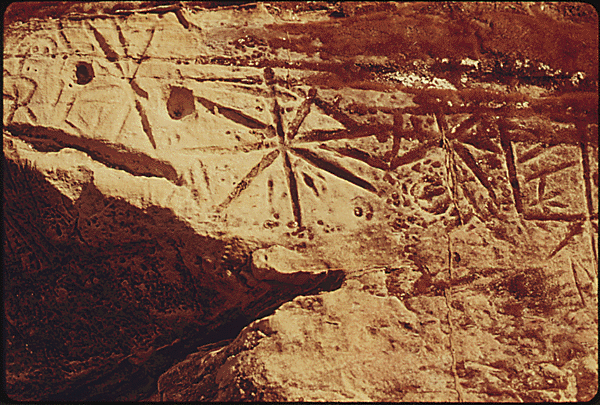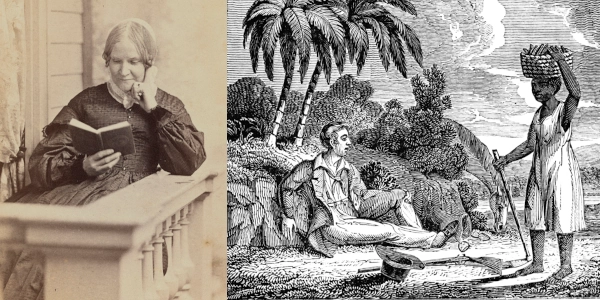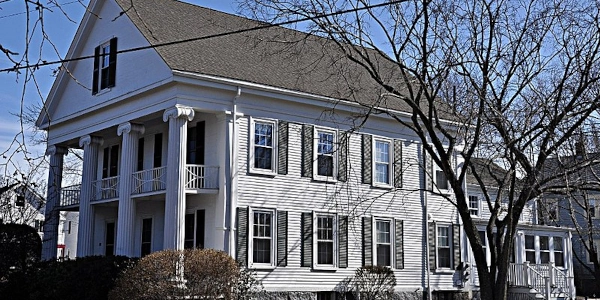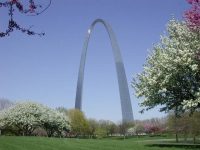
Indian petroglyphs mentioned in the journals of the Lewis and Clark expedition. Nemaha River, Troy, Kansas. Courtesy National Archives. Right: Historic New Orleans wharf scene along the Mississippi River. Courtesy Library of Congress.
Sponsor this page for $125 per year. Your banner or text ad can fill the space above.
Click here to Sponsor the page and how to reserve your ad.
-
Timeline
1802 Detail
February 11, 1802 - Lydia Child is born and would become a foremost author expounding the idea of an American abolitionist.

It's another one of those cases, not unlike that of Sarah Josepha Hale where her notoriety to fame today is the least important of her achievements. However, Lydia Maria Child, born in 1802 in Medford, Massachusetts, to Susannah (Rand) and Convers Francis, and known as Lydia Maria Francis until marriage, is best know for writing the Thanksgiving poem, "Over the River and Through the Woods." But that tells so little of the story, despite its longevity and wonder as a poem and song (she did not write the music), that the tenure of her career in the abolitionist and women's movement deserves a whole lot more attention.
Child was educated at a dame school and went to seminary, known by her middle name, Maria, not her first. Her brother, Convers Francis, a Unitarian minister, taught her the classics, and met with many of the top writers of the day while living with him in her early 20's. Although she had never considered the profession of writing, her brother's encouragement led to the publication of her first novel in 1824, Hobomok, under the name An American. It dealt with the marriage of a white woman to a Native American.
From the fore, Lydia Child wrote about themes of American life that she thought needed change. In 1826, she founded a children's magazine known as the Juvenile Miscellany, running it for eight years. During that time, she continued to write other works that dealt with the abolition and horror of slavery, which cost her readers of the magazine in the South. She also married David Child, who agreed with her positions.
She wrote on many topics, some non-controversial. A recipe and thrift household book named, "The American Frugal Housewife," had thirty-three printings over twenty-five years. However, by 1831, both her and her husband began delving into the issues of women's rights and abolition of slavery. She had some disagreement with the movements, thinking that the abolition of slavery must come first, as both were linked to the subjugation of one to another. However, she did not believe in all female communities, and her thoughts sometimes conflicted with the American Anti-Slavery Society, of which she urged female membership, causing it to split.
The most influential writings of her career on the topic of slavery came in 1833 when she wrote, "An Appeal in Favor of that Class of Americans Called Africans." It called for immediate emancipation with no compensation to owners and considered the intellectual capacity of blacks to be equal to their European counterparts. It was the first anti-slavery book published in America in book form, and some say, the first woman to broach the subject in that manner.
By 1839, Child was on the executive committee of the American Anti-Slavery Society (AASS), and later editor of the society's National Anti-Slavery Standard in 1840, establishing it as one of the most popular abolitionist newspapers. She continued to write in other forms; her short story fiction often included tracts railing against slavery, as well as an increasing amount of articles about women's rights, including the right to vote.
But her writings also continued to include more amenable and softer books and poems, including that famous one in "The New-England Boy's Song about Thanksgiving Day, now known as "Over the River and Through the Woods," in 1844. However, as she delved into poetry akin more to the lightness of life, she did not forget her true passions, as the below letter to her brother denotes.
TO PROF. CONVERS FRANCIS.
New York, December 6, 1846.
About once a fortnight I go to a concert, music being the only outward thing in which I do take much pleasure. Friend Hopper bears a testimony against it, because he says it is spiritual brandy which only
serves to intoxicate people. We had quite a flare-up here about a fugitive slave, and I wrote the "Courier" an account of it. I have
been much amused at the attacks it has brought on me from the papers. The pious prints are exceedingly shocked because I called him "a living gospel of freedom, bound in black. It is so blasphemous to call a man a gospel! The Democratic papers accused me of trying to influence the state election then pending. The fun of it is, that I did not know
there was an election. I could not possibly have told whether that event takes place in spring or fall. I have never known anything about it since I was a little girl on the lookout for election cake. I know
much better who leads the orchestras than who governs the State.

Through the Civil War
As the 1850's began to push the subject of slavery to a head, Lydia Child wrote about its abuses, whether that be the beating of Charles Sumner, an abolitionist, on the Senate floor in the poem, "The Kansas Emigrants," and in letters to her colleagues.
TO MRS. S. B. SHAW.
Wayland, 1856.
The outrage upon Charles Sumner made me literally ill for several days. It brought on nervous headache and painful suffocations about the heart. If I could only have done something, it would have loosened
that tight ligature that seemed to stop the flowing of my blood. But I never was one who knew how to serve the Lord by standing and waiting ; and to stand and wait then! It almost drove me mad. And that miserable Faneuil Hall meeting! The timeserving Mr. talking about his "friend" Sumner's being a man that " hit hard! making the people laugh at his own witticisms, when a volcano "was seething beneath their feet! poisoning the wellspring of popular indignation, which was rising in its
might! Mr. A., on the eve of departing for Europe, wrote to me, " The North will not really do anything to maintain their own dignity. See if they do! I am willing to go abroad, to find some relief from the
mental pain that the course of public affairs in this country has for many years caused me." But I am more hopeful. Such a man as Charles Sumner will not bleed and suffer in vain. Those noble martyrs of
liberty in Kansas will prove missionary ghosts, walking through, the Land, rousing the nation from its guilty slumbers. Our hopes, like yours, rest on Fremont. I would almost lay down my life to have him
elected. There never has been such a crisis since we were a nation. If the slave-power is checked now, it will never regain its strength. If it is not checked, civil war is inevitable; and, with all my horror of bloodshed, I could be better resigned to that great calamity than to endure the tyranny that has so long trampled on us. I do believe the North will not, this time, fall asleep again, after shaking
her mane and growling a little.
I saw by the papers that Mr. Curtis was in the field, and I rejoiced to know he was devoting his brilliant talents and generous sympathies to so noble a purpose. I envy him; I want to mount the rostrum myself. I have such a fire burning in my soul, that it seems to me I could pour forth a stream of lava, that would bury all the respectable servilities, and all the mob servilities, as deep as Pompeii ; so that it would be an enormous labor ever to dig up the skeletons of their memories.
We also talk of little else but Kansas and Fremont. What a shame the women can't vote We'd carry our" Jessie" into the White House on our shoulders; wouldn't we? Nevermind! Wait a while! Woman stock is rising in the market. I shall not live to see women vote; but I'll come and rap at the ballotbox. Won't you? I never was bitten by politics before; but such mighty issues are depending on this election that I cannot be indifferent," Lydia Child.
Those violent raids in Kansas and John Brown's attempt at Harpers Ferry, although she disagreed with their violence, sometimes seemed a necessary, if ill-thought step with Child. She even asked to nurse Brown's health, although he disagreed.
CORRESPONDENCE BETWEEN MRS. CHILD, JOHN BROWN, AND GOVERNOR WISE AND MRS. MASON OF VIRGINIA.
TO GOVERNOR HENRY A. WISE.
Wayland, Mass., October 26, 1859.
Governor Wise, I have heard that you were a man of chivalrous sentiments, and I know you were opposed to the iniquitous attempt to force upon Kansas a Constitution abhorrent to the moral sense of
her people. Relying upon these indications of honor and justice in your character, I venture to ask a favor of you. Inclosed is a letter to Captain John Brown.Will you have the kindness, after reading it yourself, to transmit it to the prisoner?
I and all my large circle of abolition acquaintances were taken by surprise when news came of Captain Brown's recent attempt; nor do I know of a single person who would have approved of it, had they been
apprised of his intention. But I and thousands of others feel a natural impulse of sympathy for the brave and suffering man. Perhaps God, who sees the inmost of our souls, perceives some such sentiment
in your heart also. He needs a mother or sister to dress his wounds, and speak soothingly to him. Will you allow me to perform that mission of
humanity? If you will, may God bless you for the
generous deed! I have been for years an uncompromising abolitionist,
and I should scorn to deny it or apologize for it as much as John Brown himself would do. Believing in peace principles, I deeply regret the step that the old veteran has taken, while I honor his humanity towards those who became his prisoners. But because it is my habit to be as open as the daylight, I will also say, that if I believed our religion
justified men in fighting for freedom, I should consider the enslaved everywhere as best entitled to that right. Such an avowal is a simple, frank expression of my sense of natural justice. But I should despise myself utterly if any circumstances could tempt me to seek to advance these opinions in any way, directly or indirectly, after your
permission to visit Virginia has been obtained on the plea of sisterly sympathy with a brave and suffering man. I give you my word of honor, which was never broken, that I would use such permission solely and
singly for the purpose of nursing your prisoner, and for no other purpose whatsoever.
Yours respectfully,
L. Maria Child.
In 1860, one year after the Harpers Ferry attempt, Child wrote perhaps her most scathing attack on the lack of progress toward emancipation, "The Duty of Disobedience to the Fugitive Slave Act: An Appeal to the Legislators of Massachusetts," and provided shelter for runaway slaves trying to escape the statute.
After the Civil war ended, she returned to the subject of Native American rights, "An Appeal for the Indians," was a pamphlet urging justice toward them, which helped lead to the founding of the U.S. Board of Indian Commissioners and Peace Policy of U.S. Grant.

Over the River and Through the Woods
While it may not have been her most important achievement, the longevity and love for the poem she wrote about going to her grandfather's house (many now replace it with grandmother's house, but the original wording was grandfather's) should not be ignored either. The house still exists, expanded from the small farmhouse it was in Child's day, was refurbished by Tufts University, is listed on the National Register of Historic Places, and is now a private residence.
Poem
Over the river, and through the wood,
To Grandfather's house we go;
the horse knows the way to carry the sleigh
through the white and drifted snow.
Over the river, and through the wood,
to Grandfather's house away!
We would not stop for doll or top,
for 'tis Thanksgiving Day.
Over the river, and through the wood-
oh, how the wind does blow!
It stings the toes and bites the nose
as over the ground we go.
Over the river, and through the wood-
and straight through the barnyard gate,
We seem to go extremely slow,
it is so hard to wait!
Over the river, and through the wood-
When Grandmother sees us come,
She will say, "O, dear, the children are here,
bring a pie for everyone."
Over the river, and through the wood-
now Grandmother's cap I spy!
Hurrah for the fun! Is the pudding done?
Hurrah for the pumpkin pie!
Over the river, and through the wood,
with a clear blue winter sky,
The dogs do bark, and children hark,
as we go jingling by.
Over the river, and through the wood,
to have a first-rate play.
Hear the bells ring, "Ting-a-ling-ding!",
Hurrah for Thanksgiving Day!
Over the river, and through the wood,
no matter for winds that blow;
Or if we get the sleigh upset
into a bank of snow
Over the river, and through the wood,
to see little John and Ann;
We will kiss them all, and play snow-ball
and stay as long as we can.
Over the river, and through the wood,
trot fast, my dapple-gray!
Spring over the ground like a hunting-hound!
For 'tis Thanksgiving Day.
Over the river, and through the wood,
Old Jowler hears our bells.
He shakes his pow, with a loud bow-wow,
and thus the news he tells.
Photo above: Montage (left) photo of Lydia Maria Child on her porch, 1865, John Adams Whipple. Courtesy Library of Congress; (right) illustration from Child's book, "An Appeal in Favor of that Class of Americans Called Africans," 1833, Lydia Child. Courtesy archive.org via Wikipedia Commons. Photo below: Original Grandfather's house, James Curtis House, mentioned in Child's Poem, 2005, Daderot at en.wikipedia, C.C. 3.0. Info Sources: Library of Congress; archive.org; Wikipedia Commons; National Archives; "Letters of Lydia Maria Child," 1882, John Greenleaf Whittier, Wendell Phillips, Harriet Winslow Sewall, University of Michigan Library.




